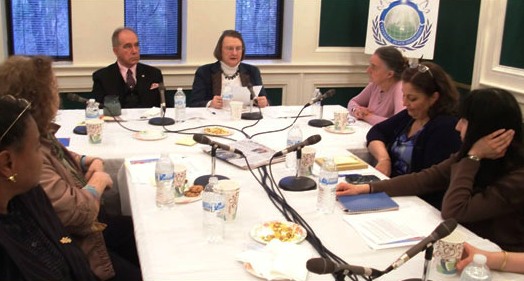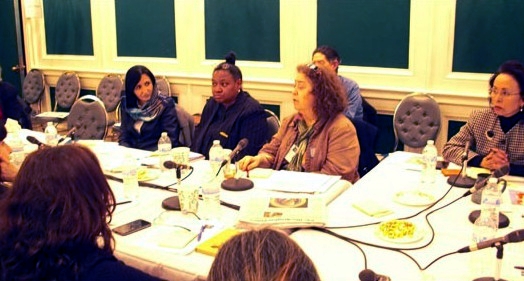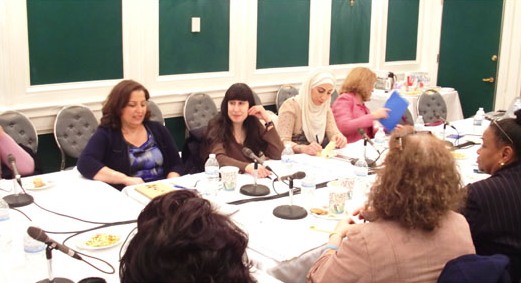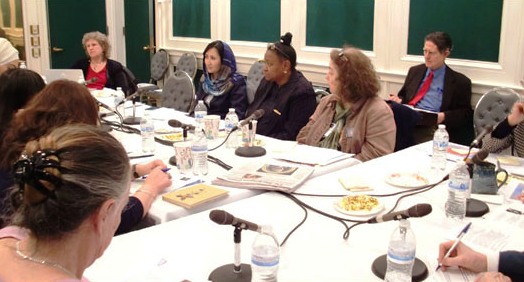![]()
The Words of the Selig Family
|
|
The Words of the Selig Family |

In the midst of the civil war in Syria lasting almost three years, and seeming to have no end in sight, an important resource has been underutilized – women, who surely must play a significant in Syria's transition to a peaceful democracy, as peacemakers and bridges for peace.
What is the answer to the endless killing and suffering? A military solution has not ended the conflict. Many say a solution to end the violence can only come through diplomacy. However there is a growing sentiment that male-dominated diplomacy does not represent the whole of society and is incapable to bring a negotiated settlement for all the people.
The Syrian Uprising began in 2011 between the forces loyal to President Bashar al-Assad and civilians peacefully protesting his regime, who later took up arms in self-defense after being faced with intense brutality. Hezbollah, the Islamic militant group based in Lebanon. Russia and Iran support Assad. According to the UN, in July 2013, the Syrian government controlled approximately 40% of the country's territory and 60% of the population. More than 130,000 have died and more than five million Syrians have been displaced. The US supports the Syrian National Coalition that was formed in 2012.
Since the historic UN Security Council Resolution 1325 (Oct. 31, 2000), which called for the adoption of a gender perspective that includes the special needs of women and girls, unbiased experts have testified that chances for sustainable peace are decisively increased with the inclusion of women in conflict resolution and the peace building process.
With both religious and secular forces in Syria aiming to limit the role of women, and making it difficult for women to influence change, step one is to call for equality between women and men. As one Syrian woman said, "The uprising in my country was never just political but also a social revolution. It gives women the strength to say what we want."

On January 15, 2014, with the Geneva-II conference scheduled to convene in little more than a week's time, the Washington DC Office of Peace and Security Affairs convened a forum on "Women's Role in Syria's Transition and Reconciliation." Two papers were presented in absentia. They had been written for the forum by two European women, Ann Marie Lizin and Patricia Lalonde, who are active in the arena of women's rights and protections. The two authors attended the recent Middle East Peace Initiative program in Jerusalem and are leading the development of a UPF-sponsored meeting of women in Geneva at the same time as the Geneva-II talks.
The moderator, Louise Strait, is a member of the advisory board of the Middle East Concerns Committee of the National Capital Presbytery of the Presbyterian Church, USA. The majority of the participants were women, and included the First Secretary of the Embassy of Afghanistan, representatives of the Coalition for a Democratic Syria, United for a Free Syria, the International Center for Religion and Democracy, George Mason University's School for Conflict Analysis and Resolution, and several other prominent community leaders and activists.
Dr. Antonio Betancourt, Director, Office of Peace and Security Affairs, Washington, DC-UPF International opened the forum with brief remarks before turning the program over to the women. He noted that "Each month, UPF's Office of Peace and Security Affairs hosts a roundtable to examine the volatile areas of tension and conflict that exist throughout the world," and the Syrian conflict presents one of the world's most urgent issues, which surely needs significant involvement of women at many levels.
In her opening remarks, the moderator, Louise Strait, asserted that the lack of gender balance, which "translates as unconditional acceptance of masculine priorities, or, to use a more hackneyed term, patriarchy, has been codified in the founding Scriptures and philosophies of both East and West and has had terrible consequences, not just for women."
She asked a probing question: "What if women had been among the signers of the American Declaration of Independence? Consider, then, that the iconic woman of the Revolutionary era could have been one of them, rather than someone who was reported to have sewed up a flag. What if John Adams had heeded his wife Abigail's letter to him and 'considered the ladies' by doing as she suggested and guarantee women the right to vote in the Constitution?" in 1776?
Strait suggested that if women's voices had been heard through universal suffrage by the beginning of the 20th century we might not have had World War I, which "normalized the concept of total war, especially the killing of noncombatant women and children, but also surrendered Syria to France in the power grab known as the French mandate (also repeated to the south and east in the British Mandate)."
She concluded with a poem, "Silent," by a young Peruvian woman who is encountering the Middle East for the first time on a trip to Israel and Palestine organized by Interfaith Peace Builders. "Silent" conveys the angst shared at a Bereaved Families Forum in which an Israeli father and a Palestinian father, who had both lost young daughters to unprovoked attacks, each offered his testimony.
SILENT
When you know, it is impossible to
stay silent,
When you meet someone and recognize them, they become
your neighbor.
When you know, it is impossible to stay
silent,
When you recognize your neighbor, you start to care for
them,
When you care, you care as you would for yourself,
Why do
we do nothing? It makes us complicit in silence.
When you know,
the sins of your body and soul cannot be silent,
When you meet,
you accept the call,
Because when you accept your neighbors, they
become your brother and sister.
When you know, it is impossible to
stay silent,
In a land where we are all human brothers and
sisters.
Tomiko Duggan, Acting Secretary General of UPF North America, read the statement by Patricia Lalonde, Research Fellow with the European Institute for Prospective and Security. (See link for the full statement.)
Lalonde put a question on the table: "Why is it that in our crisis management, especially in the Middle East, we take into consideration the rights of minorities – but not the rights of women?" The West must bear some of the responsibility of the current crisis for not insisting on a policy that respects women's rights. "It exposes a disdain for the rights of over half the population… A society that is committed to a policy of gender apartheid is doomed to implode because it destroys the family, which is the basic building block of a healthy society." Lalonde calls on the Geneva II Conference "to provide an opportunity to bring into the diplomatic discussions the rights of women. These rights are an integral part of political realism and cannot be viewed as a superfluous feminine fashion. It is women and their families that suffer the most disastrous consequences of bloody dictatorial repression and civil war."
Ann Marie Look, Ph.D., President, We Can Education and Development Strategies Foundation, read the statement (see link for full statement) by Anne-Marie Lizin, Honorary Speaker of the Senate of the Kingdom of Belgium; and Member of the Belgian Government (1988-1992).
Lizin makes an important observation regarding Syria: "We have in hand the possibility of showing that women's rights are not only a social matter, or a question of justice in society, but that they may also play a strategic role. This is the real argument to give them a role in the peace process: giving the floor to women will give the floor to a real group of Syrians who will never let Al-Qaeda take power. Syrian women can be the group refusing to allow the extremists of Al-Qaeda foreign battalions to take power. This is the evident reason to give them a role in the UN conference of Geneva-II. If you ask how to avoid Syria becoming a state where the jihadist militias are making the laws, and specially Sharia against women's basic rights like the minimum age of marriage. … It is then imperative to give them the floor."
Lizin proposes to add women to the official delegations to the Geneva-II Syrian Peace Conference and to the UPF program entitled "Geneva: Track II" which will be held concurrently with the "Geneva-II," inter-governmental conference. She says that: "The best way to weaken Islamist extremists in Geneva-II is by adding women to the opposition delegations."
Lizin sent a translated summary of a letter written by a Kurdish Syrian woman, Mellek Rhodi, a member of the Democratic Union Party (PYD). The PYD, based in Brussels, is described by the Carnegie Middle East Center as: "One of the most important Kurdish opposition parties in Syria." Rhodi's letter reports significant advances for women being achieved through the ongoing development toward an autonomous democratic administration in Rojava (the Kurdish name for Northern Syria), and Syrian Kurdish women are planning to attend the Geneva-II meetings.

The mood of the meeting was cordial and active throughout. The two Syrian women, in particular, shared personal testimony and first-hand knowledge about the situation in Syria.
Hiba Dlewati, a Syrian-American was a medical student in Damascus when the revolution began. She participated in demonstrations and was detained twice (her father, a Syrian-American physician working in Damascus was detained because of her as well). Dlewati currently works in the PR arena for United for a Free Syria, one of the organizations of Coalition for a Democratic Syria. "I was a peaceful activist in Syria. I worked in non-political affiliation. I stood up against the regime not for political reasons but for basic human rights and outrage against all the violations the regime was committing." Among many points that Hiba raised is that she is a secular Muslim but that many people perceive secular and Muslim as being incompatible categories, especially in Syria where the Assad regime branded itself as secular, but was in fact repressive.
The situations in Egypt, Tunisia, and Libya were contrasted with Syria. Bushra Sangid, of the Coalition for a Democratic Syria (CDS), acknowledged the important role of women. "Women will stop Al Qaeda from joining the country because they treat women very badly. They put them backwards," she said.
Betancourt gave some background context to the UPF program in Geneva, which will parallel Geneva-II, the UN backed international conference led by the UN peace envoy to Syria, Lakhdar Brahimi with the aim to end the Syrian civil war and discuss a transitional government. "For the first time in these international discussions," said Betancourt, "this issue of the role of women is becoming strong. It wasn't there in Egypt. It wasn't there in Tunisia. It wasn't there in Libya but it is now and this is the key. This is the big difference between then and now." An important point was that it would be a mistake to portray women only as victims in the Syrian conflict because many women from all walks of life are proactively engaged in addressing the needs of the people despite all the obstacles before them.
The participants discussed how to get women activists at the Peace Talks table and have their voice heard in the Syrian society. Look said it's important that people understand that whatever benefits come to women will also be shared by others who are not heard, such as the elderly, sick, young, wounded, and torture victims. "Women understand that peace benefits everyone, not just women. When the rights of women are recognized, then everyone will gain."
Diane Perlman, Visiting Scholar at George Mason University's School for Conflict Analysis and Resolution, said: "It's essential to have more women at the table, otherwise it is a one-sided imbalance." She criticized the use of certain terms, such as soft power. "There's a tendency, she said, to identify women with peace and men with war. We have to transcend terms that split us. It should be less about splitting and more about integration."
Sangid made some recommendations, namely, (1) the need to support the Coalition for a Democratic Syria, the legitimate representation for the Syrians with financial aid and resources, and (2) to work with the opposition organizations and gather the names of women "who are really working and making effort for this peace."
Responding to a question from Duggan about what the participants would like to see happening, Sangid replied, "What we would like to see is a negotiated peace. We would like to see at least three women at that table. We want to know how can we reach the UN and those responsible for the negotiations? How can we talk to them and express these points. That's what we need to hear and know how you can help us." Duggan offered to explore the possibility of a UPF strategic plan. She briefed the group about the activities of the UPF chapter in Geneva and its activities with the NGO community and civil society especially to advocate human rights issues. "We need to find our voice," she said, "Raise our voice."
Dlewati articulated the goals for the Peace Talks. She said, "The goal of Geneva is to stop the violence, which is what all Syrians want except for the regime, and warlords who are still making money and getting power from the situation. The only way to stop the violence is for Assad and his regime to leave. We must free the political prisoners, and release kidnapping victims. These are basic human rights."
"Of course, there should be more women at the table. That's a given and they should not be women who are there just because everybody knows them because they have been on TV. There should be women at the table because they have been active, have support from people who believe in them, who they can look at and say 'yes, they represent us and I believe she's been doing a good job. I believe she is going to fight at the Geneva table for my father who was in prison. She must speak up for the people and cities. Stop the shelling. Speak for the women who are stopped and harassed at the regime check points. We need women who are outspoken, who are educated to make the argument that there is more that Syria can do."
Rebecca Cataldi, Program Manager, The International Center for Religion and Democracy, asked about the role women will play in this revolutionary society.
Dlewati explained that, "It's very important that moderates push out Al-Qaeda from Iraq and Syria, which they are already doing. Extremists must be pushed out, and yes they are a big threat and one that needs attention, but they are not the main threat. If it weren't for Assad extremists wouldn't have even trickled into Syria. Assad and his regime, who regularly violate human rights on a massive scale and use aerial warfare and chemical weapons against their own people are the main threat. What we want is a free, self-determined government like what the US has, not a military government. How can we play a role to empower women in Syria? Education is open but not everybody has access to it because of poverty. Since the revolution escalated into a war, there is a loss of jobs. Employment is very important for both men and women. We must try to revive basic opportunities of employment or education to those who wish to pursue and finish their education. That has worked well in other places in the world."

The moderator closed the program by reading a letter written in 1776 by Abigail Adams to her husband, John Adams, imploring him to work toward a constitution that would be more inclusive of women.
REMEMBER THE LADIES
I long to hear that you have declared an independency. And, by the way, in the new code of laws, which I suppose it will be necessary for you to make, I desire you would remember the ladies and be more generous and favorable to them than your ancestors.
Do not put such unlimited power into the hands of the husbands. Remember, all men would be tyrants if they could. If particular care and attention is not paid to the ladies, we are determined to foment a rebellion, and will not hold ourselves bound by any laws in which we have no voice or representation.
That your sex are naturally tyrannical is a truth so thoroughly established as to admit of no dispute; but such of you as wish to be happy willingly give up -- the harsh tide of master for the more tender and endearing one of friend.
Why, then, not put it out of the power of the vicious and the lawless to use us with cruelty and indignity with impunity?
Men of sense in all ages abhor those customs which treat us only as the (servants) of your sex; regard us then as being placed by Providence under your protection, and in imitation of the Supreme Being make use of that power only for our happiness."
Betancourt thanked everyone for their participation, and offered the meeting space for future gatherings.
Host: Dr. Antonio Betancourt -- Director, UPF Office of Peace and Security Affairs
Moderator: Louise Strait -- Member of the advisory board of the Middle East Concerns Committee of the National Capital Presbytery of the Presbyterian Church, USA
Patricia Lalonde, Research Fellow, Institute for Prospective and Security Studies in Europe
Ann Marie Lizin, Honorary President, Senate of Belgium
Dr. Ann Marie Look, President, We Can Education and Development Strategies Foundation
Tomiko Duggan, Acting Secretary General, UPF North America
Madina Qasimi, First Secretary, Embassy of Afghanistan
Dr. Bushra Sangid, Member, Coalition for a Democratic Syria
Hiba Dlewati, Public relations, United for a Free Syria
Dr. Diane Perlman, Visiting Scholar, School for Conflict Analysis and Resolution, George Mason University
Rebecca Cataldi, Program Manager, The International Center for Center for Religion and Diplomacy
Prof. Diane Falk, Research writer and editor
Min. Chi Mauuso, Clergy, Christian Outreach Center for Deliverance
Glenn Strait, Citizens Proposal for a Border Between Israel and Palestine
William Reed, President, Black Press Foundation
Dr. Mark P. Barry (via Skype), Advisor, UPF Office of Peace and Security Affairs
Dr. William Selig, deputy director, UPF Office of Peace and Security Affairs
Glenn Strait contributed to this report.